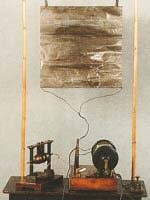Heinrich Hertz was the first man to detect radio waves in 1887 by causing a spark to leap across a gap that generated electromagnetic waves. He built the oscillator and resonator by 1893.
Oliver Lodge in Britain, Alexander Popov in Russia, and Edward Brauley in France - filled a glass tube with metal filings that would cohere under electromagnetic waves. Once the tube was tapped, the filings would collapse to break the circuit.
It was Guglielmo Marconi invented his spark transmitter (right) with an antenna

in his home in Bologna, Italy around 1894. He took what was known as his "Black Box" to Britain in Feb. 1896 and filed for British Patent number 12039 on June 2, 1896. Marconi formed the Wireless Telegraph and Signal Company in Britain in 1897 at the age 23, and the world's first radio factory on Hall Street in Dec. 1898. The American Marconi Co. was formed in 1899. He controlled patents for the Lodge tuner of 1900 with dial, and Fleming valve of 1904 that acted as a diode tube to amplify electrical current in one direction. Marconi's company sold spark transmitters to the U.S. Navy.
An inventor named Reginald Fessenden of Canada developed the continuous-wave voice transmitter 1905, using a high-frequency alternator developed by Charles Steinmetz at GE 1903. He made a voice broadcast over the North Atlantic on Christmas Eve 1906.
Today, the radio business has become ultra modern in comparison, and schools like the Radio Connection are helping students get a mentor so they will not only learn the history and basics about radio and broadcasting, but they will also learn the skills for success.






